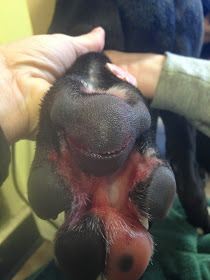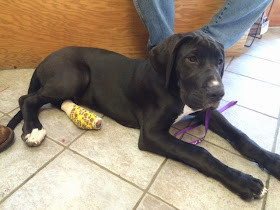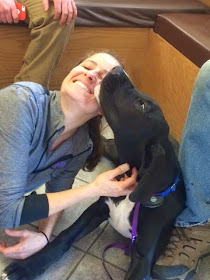 |
| Remington |
This particular Sunday was the early part of March, about three days after the last foot of winter snow had been dumped on us. The sun was convinced Spring was summoning Winter to fall back and the last two days were warm and welcome. The result was a snow covered landscape with a layer of ice to insulate.
Normally this is not a problem for dogs. Dogs develop hard keratinized foot pads which are both durable and grip terrain, save for the young-uns. The young pups haven't beat the foot pads into a thick tough shell impervious to tree branches, sharp rocks, and certainly not sharp icy edges.
On a quick romp in the snow Remington returned with this laceration.
Which was this deep.. all the way through the skin of the foot pad.
Wound Care 101;
1. Stop Bleeding,
Here's the deal with skin wounds... Skin bleeds a lot! The best way to stop every kind of bleed is with firm direct pressure. After the bleeding is under control it is time to get a clean wound.
2. Get Clean,
The best way to clean a foot wound is to soak the whole foot in an antibiotic bath. We typically use either dilute betadine or chlorhexadine wash, but at home soapy water will do about as much good as any fancy medical grade wash.
3. Protect the Wound,
For pups this is best accomplished with a bandage. But beware, out of sight cannot include out of mind. Bandages require due diligence in keeping them dry and clean. A wet bandage needs to be changed immediately and if your dog begins to limp or lick at the foot they are telling you that something under that bandage is brewing. See your vet often.
Foot pad lacerations are notoriously difficult to manage. I always try to manage these by second intention healing. This is essentially allowing the wound to heal on its own without surgical intervention. I know it sounds counter intuitive, but it is almost impossible to keep the foot pad quiet enough to not allow the sutures to pull through.
The bandage should be changed daily until the wound is well scabbed over. I send my clients home with;
1. Bandage supplies, about $15.00
2. Foot soak solution, about $8.00
3. Antibiotics, oral, about 14 days worth, about $25.004. NSAIDs for pain and inflammation a few days worth
I also make a homemade bootie protectors..
These wounds should be kept clean, bandages need to be kept clean and dry and the pet should be kept as calm and quiet as possible to minimize stress on the laceration site so it can heal.
And a kiss always helps speed up the healing process.
If you have a pet question you would like answered, or you have a pet experience that might benefit other pet lovers please join me on Pawbly.com. Pawbly is a free open community to help pets and their people. It is free to use.
You can also find me at the clinic, Jarrettsville Vet, or on Twitter @FreePetAdvice.




Hello! We are going through this as we speak. What would you say the recovery time for something like this is?
ReplyDelete